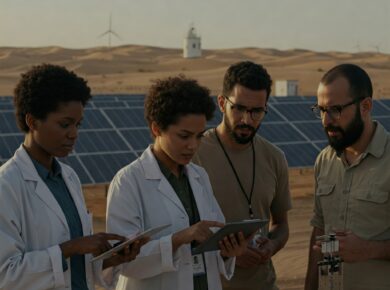The spacecraft of a UAE astronaut has been relocated outside the ISS in a thrilling mission.
UAE astronaut Sultan AlNeyadi and his Crew-6 mates have successfully completed the relocation of SpaceX Dragon Endeavour outside the orbiting International Space Station (ISS) on Saturday at 4.01pm (UAE time). The spacecraft, which is used to transport astronauts and supplies between Earth and ISS, is now docked on the forward port of International Space Station’s Harmony module. The move made room for the arrival of an uncrewed SpaceX Dragon resupply services mission scheduled for launch in June.
This marks the 27th relocation in International Space Station history, and the Crew-6 members accomplished the task in over an hour after undocking from the space-facing port of the International Space Station’s Harmony module. Nasa astronauts Stephen Bowen and Woody Hoburg, and Roscosmos cosmonaut Andrey Fedyaev were the other members of the team. Bowen served as the commander of the relocation mission, while Hoburg piloted the spacecraft. AlNeyadi and Fedyaev assisted with the manoeuvre. The quartet were supported by the Mission Control Centre at the Nasa Johnson Space Center in Houston and SpaceX in Hawthorne, California.
Ahead of the mission, AlNeyadi sent out a tweet talking about the ‘exciting times ahead’. He shared how he and his teammates suited up and prepared for the task. The relocation of the spacecraft was crucial as it freed up the zenith port on Harmony, giving the Canadarm2 robotic arm easier access to the International Space Station Roll-Out Solar Arrays (IROSAs) that will arrive during the commercial resupply mission.
The installation of new solar arrays on the International Space Station will be completed through a series of spacewalks, one of which was the seven-hour extravehicular activity (EVA) completed last week by Bowen and AlNeyadi, who entered space history as the first-ever Arab astronaut who did a spacewalk outside the International Space Station.
Crew-6 have now entered their third month in space and are targeted to return to Earth in August, according to Nasa. Meanwhile, two Saudi astronauts, Rayyanah Barnawi and Ali AlQarni, are set to join AlNeyadi aboard the orbiting space laboratory for 10 days. They are part of the Axiom Space 2 Mission that is scheduled for liftoff in the early hours of May 22.
This will be the first mission for Saudi Arabia’s new astronaut programme, and it will be the first time that as many as three Arab astronauts will be onboard the International Space Station. The mission is a significant milestone in the Arab world’s efforts to develop a space sector and promote scientific research and development.
The UAE’s space programme has been making strides in recent years, with the launch of several satellites and the sending of its first astronaut, Hazzaa AlMansoori, to the International Space Station in 2019. AlNeyadi’s mission is another step forward for the UAE’s ambitions to become a leader in space exploration and technology.
In addition to the UAE and Saudi Arabia, other Arab nations are also pursuing space programmes, including Egypt, Morocco, Algeria, and Tunisia. These programmes are a reflection of the growing interest in space exploration and the role it can play in promoting scientific research, technology development, and national development. As more Arab countries enter the space race, there is the potential for increased cooperation and collaboration in the field, leading to new discoveries and advancements for the benefit of all.
The successful completion of the SpaceX Dragon Endeavour relocation mission marks another milestone for the UAE’s space program and for the Arab world as a whole. It is a testament to the skill and dedication of the crew members, who worked together seamlessly to execute the manoeuvre.
Sultan AlNeyadi, the first Emirati to be selected for the UAE astronaut program, has played a vital role in this achievement. His experience and expertise were crucial in the successful completion of the mission, and his historic spacewalk alongside Stephen Bowen made headlines around the world.





